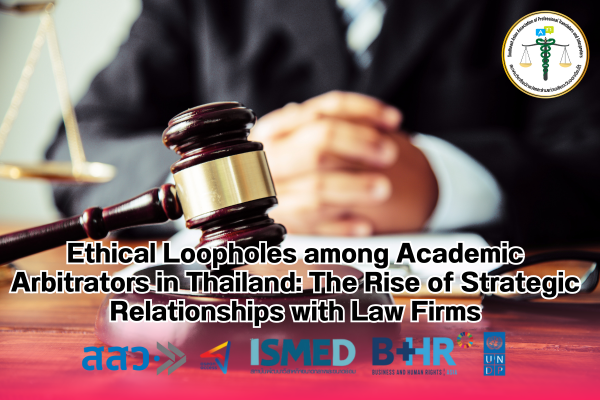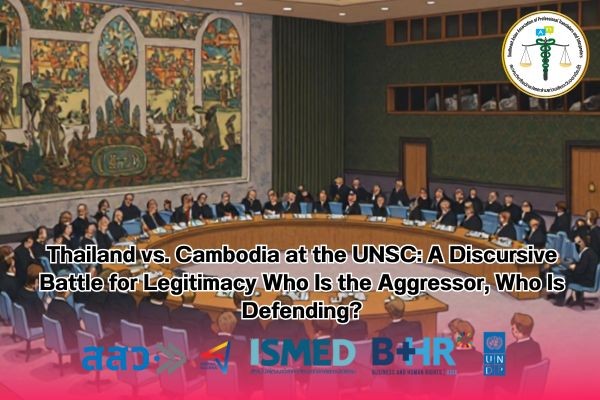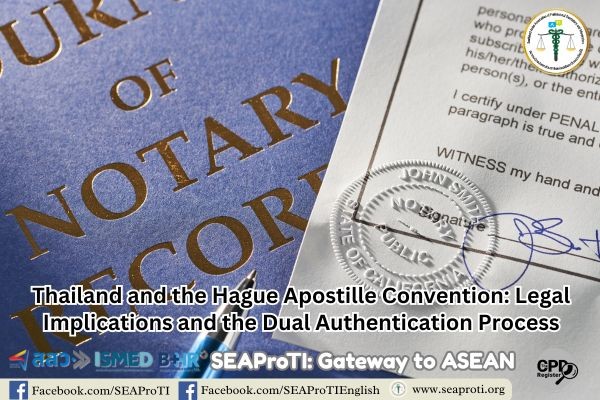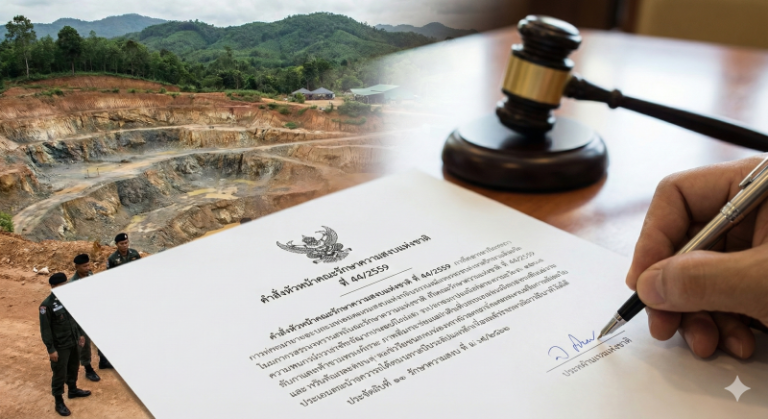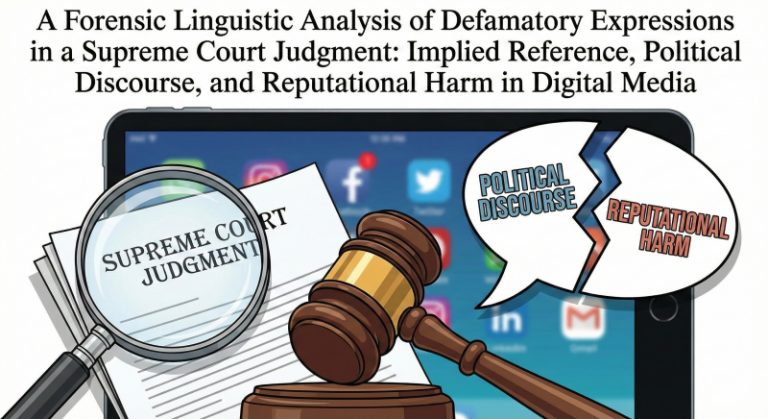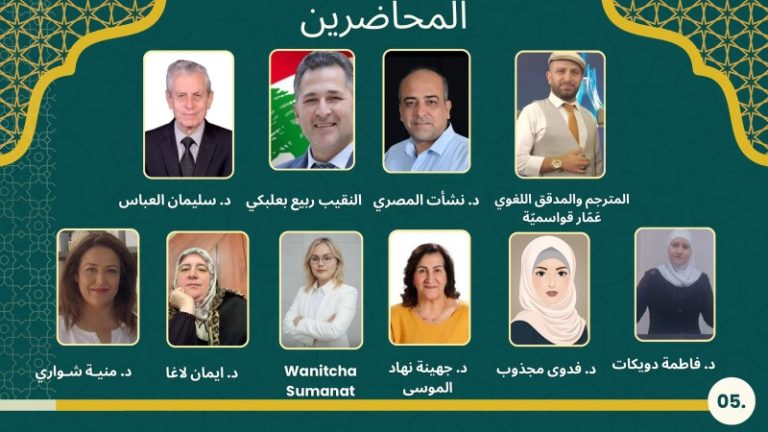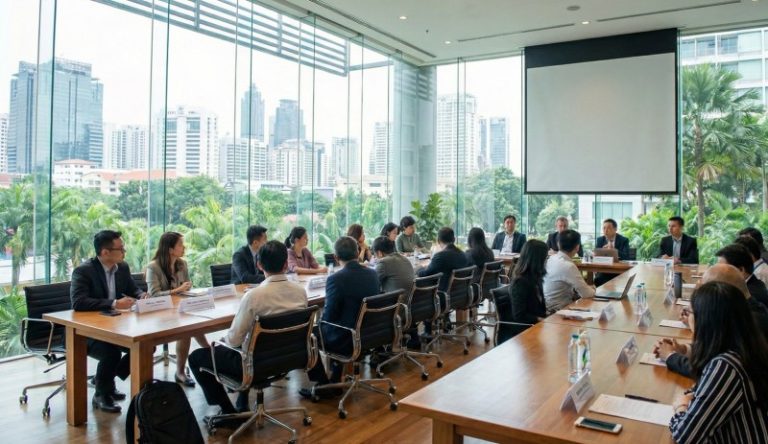Ethical Loopholes among Academic Arbitrators in Thailand: The Rise of Strategic Relationships with Law Firms
This article explores the growing trend among academic arbitrators in Thailand of leveraging personal and professional relationships with law firms and legal practitioners to secure appointments in commercial and private arbitration cases. The analysis highlights a critical ethical loophole that contradicts international standards of impartiality and independence expected of arbitrators, as outlined in the UNCITRAL Model Law and the IBA Guidelines on Conflicts of Interest in International Arbitration. The article concludes by proposing structural reforms to protect the integrity and public trust in Thailand’s arbitration system.
1. Introduction
Arbitration is a widely recognized form of Alternative Dispute Resolution (ADR), prized for its speed, flexibility, and the subject-matter expertise of arbitrators. However, the credibility of arbitration hinges on two core principles: impartiality and independence of the arbitrator.
In Thailand, many arbitrators are drawn from academia, particularly university professors specializing in law. While their expertise is often substantial, there is an increasing tendency among some academic arbitrators to cultivate strategic relationships with law firms in order to be nominated as arbitrators in future disputes. These practices raise serious ethical concerns and challenge the fairness of the arbitration process.
2. Forms of Relationship-Based Appointment Practices
2.1 Free Training for Law Firms
Some academic institutions organize arbitration or legal training programs and invite lawyers from large firms to attend free of charge. While framed as educational outreach, these events often carry an implicit understanding that the hosting academic may later be nominated as an arbitrator in relevant disputes.
2.2 Quid Pro Quo Compensation
In some instances, academic arbitrators have offered informal “thank you fees” or even shared arbitration fees with law firms that nominate them. These arrangements are inherently problematic and constitute a conflict of interest, as defined under the IBA Guidelines (2022).
2.3 Personal Promotion via Informal Networks
Certain professors cultivate close ties with legal practitioners or in-house counsel, directly or indirectly suggesting their own names for arbitration appointments. These recommendations are often not disclosed to the opposing party, undermining transparency and equality of arms.
3. Ethical Concerns
Such practices may not always violate Thai statutory law per se, but they clearly contravene international ethical standards that underpin fairness in arbitration:
- UNCITRAL Model Law on International Commercial Arbitration, Article 12(1), stipulates that arbitrators must disclose any facts likely to give rise to justifiable doubts as to their impartiality or independence.
- IBA Guidelines on Conflicts of Interest in International Arbitration (2022) emphasize that arbitrators must avoid any relationships—real or perceived—that could compromise, or appear to compromise, their impartiality.
4. Consequences for Thailand’s Arbitration System
- Parties without access to powerful academic or legal networks are placed at a disadvantage.
- Trust in arbitration institutions declines, particularly in cross-border disputes.
- Arbitrator selection increasingly resembles a market dynamic rather than a transparent legal process.
- Academic institutions and arbitration centers risk reputational harm due to perceived bias.
5. Policy Recommendations
- To enhance transparency and neutrality in Thailand’s arbitration system, the following reforms are proposed:
- Develop a national code of ethics for arbitrators, with clear disclosure requirements and prohibitions on conflict-laden relationships.
- Implement an Arbitrator Disclosure Record, allowing parties to examine an arbitrator’s past appointments and affiliations.
- Mandate random audits by independent institutions to uncover hidden relationships or benefit arrangements.
- Formally adopt international standards such as the IBA Guidelines and UNCITRAL Model Law as enforceable benchmarks.
6. Conclusion
The ethical vulnerabilities arising from relationships between academic arbitrators and law firms in Thailand present a deep-rooted threat to the credibility of arbitration as a neutral dispute resolution mechanism. While some in the arbitration community assert that the current system is “working well,” such claims typically reflect the perspectives of those who benefit from it—often through informal relationships or undisclosed benefits.
In contrast, international norms emphasize that arbitrators should be stranger neutrals—individuals completely unknown to both parties and unconnected to their legal representatives or witnesses. This is essential to minimize actual and perceived bias.
In Thailand, structural reform may prove challenging unless parties collectively recognize that nominating a university professor as arbitrator—especially at the recommendation of one party—warrants scrutiny. This is due to the embedded, often opaque, power relationships between academia and the legal profession.
The most effective and impartial approach is to allow the arbitral institution to select the arbitrator, ensuring the institution itself remains independent and devoid of conflicting interests. Where parties have the means, resorting to arbitration in jurisdictions such as Singapore is a viable alternative. Such jurisdictions maintain transparent rosters of arbitrators, vetted for independence, with no prior connections to any party, counsel, or witness.
Ultimately, if Thailand fails to develop mechanisms that safeguard the integrity of arbitrator appointments, its arbitration system may deteriorate into a “compulsory compromise” for parties unable to access genuinely fair and international-standard dispute resolution processes.
References
- International Bar Association. (2022). IBA Guidelines on Conflicts of Interest in International Arbitration. Retrieved from https://www.ibanet.org/
- UNCITRAL. (2006). UNCITRAL Model Law on International Commercial Arbitration (with amendments as adopted in 2006). United Nations.
- Thai Arbitration Institute (TAI). (2022). Guidelines on Arbitrator Impartiality and Independence.
- Royal Gazette of Thailand. (2019). Arbitration Act B.E. 2545 (2002), as amended.
SEAProTI’s certified translators, translation certification providers, and certified interpreters:
The Southeast Asian Association of Professional Translators and Interpreters (SEAProTI) has officially announced the criteria and qualifications for individuals to register as “Certified Translators,” “Translation Certification Providers,” and “Certified Interpreters” under the association’s regulations. These guidelines are detailed in Sections 9 and 10 of the Royal Thai Government Gazette, issued by the Secretariat of the Cabinet under the Office of the Prime Minister of the Kingdom of Thailand, dated July 25, 2024, Volume 141, Part 66 Ng, Page 100.
To read the full publication, visit: the Royal Thai Government Gazette
ช่องโหว่ด้านจริยธรรมของอนุญาโตตุลาการสายวิชาการในประเทศไทย: ปรากฏการณ์ การสร้างความสัมพันธ์เชิงผลประโยชน์กับสำนักงานกฎหมาย
บทความนี้ศึกษาปรากฏการณ์ที่อนุญาโตตุลาการสายวิชาการในประเทศไทยใช้กลยุทธ์และความสัมพันธ์เชิงผลประโยชน์กับสำนักงานกฎหมายและนักกฎหมายเอกชน เพื่อให้ตนเองได้รับการเสนอชื่อหรือแต่งตั้งเป็นอนุญาโตตุลาการในคดีทางพาณิชย์และข้อพิพาทระหว่างเอกชน โดยบทความชี้ให้เห็นถึงช่องโหว่ด้านจริยธรรมซึ่งขัดแย้งกับหลักสากลว่าด้วยความเป็นกลาง (impartiality) และความเป็นอิสระ (independence) ของอนุญาโตตุลาการ ตามแนวทางของ UNCITRAL Model Law และ IBA Guidelines on Conflicts of Interest in International Arbitration พร้อมเสนอแนวทางเชิงระบบเพื่อป้องกันความเสื่อมศรัทธาต่อระบบอนุญาโตตุลาการในประเทศไทย
1. บทนำ
ระบบอนุญาโตตุลาการเป็นกระบวนการระงับข้อพิพาททางเลือก (Alternative Dispute Resolution – ADR) ที่มีจุดเด่นด้านความรวดเร็ว ยืดหยุ่น และความเชี่ยวชาญของผู้ตัดสินข้อพิพาท อย่างไรก็ดี ความน่าเชื่อถือของระบบอนุญาโตตุลาการขึ้นอยู่กับหลักสำคัญสองประการคือ ความเป็นกลาง และ ความเป็นอิสระของอนุญาโตตุลาการ
ในบริบทของประเทศไทย อนุญาโตตุลาการจำนวนไม่น้อยมาจากสายวิชาการ โดยเฉพาะอาจารย์ประจำมหาวิทยาลัยซึ่งมีความเชี่ยวชาญด้านกฎหมาย อย่างไรก็ตาม มีแนวโน้มที่อนุญาโตตุลาการสายวิชาการบางรายอาจใช้กลยุทธ์ในการแสวงหาประโยชน์จากความสัมพันธ์กับสำนักงานกฎหมาย เพื่อให้ตนเองได้รับการเสนอชื่อในฐานะอนุญาโตตุลาการ ซึ่งก่อให้เกิดคำถามด้านจริยธรรมที่สำคัญต่อความเป็นธรรมของกระบวนการ
2. รูปแบบของความสัมพันธ์เชิงผลประโยชน์
2.1 การเชิญทนายความเข้าอบรมฟรี
มีการจัดหลักสูตรหรืออบรมเชิงวิชาการโดยสถาบันการศึกษา แล้วเชิญทนายความจากสำนักงานกฎหมายขนาดใหญ่เข้าร่วมฟรี โดยไม่เรียกเก็บค่าใช้จ่าย ด้วยความคาดหวังไม่เป็นทางการว่า หากสำนักงานกฎหมายมีข้อพิพาทในอนาคต จะเสนอชื่อผู้จัดอบรมเป็นอนุญาโตตุลาการ
2.2 การเสนอผลประโยชน์แฝง
มีกรณีที่อาจารย์เสนอ “ค่าตอบแทนพิเศษ” ให้สำนักงานกฎหมายในรูปแบบค่าขอบคุณ หรือการมีส่วนแบ่งค่าธรรมเนียม เมื่อได้รับการเสนอชื่อเป็นอนุญาโตตุลาการ ซึ่งเข้าข่าย “conflict of interest” ตามแนวทาง IBA (2022)
2.3 การเสนอชื่อผ่านการตีสนิท
อาจารย์สายวิชาการบางรายจะสร้างความสัมพันธ์กับทนายความหรือนักกฎหมายฝั่งคู่ความ และให้คำแนะนำโดยเฉพาะว่า “ตนเหมาะสม” ที่จะรับตำแหน่งอนุญาโตตุลาการในคดีนั้น โดยไม่มีการเปิดเผยความสัมพันธ์ที่แท้จริงต่ออีกฝ่าย
3. ข้อกังวลทางจริยธรรม
พฤติกรรมดังกล่าวข้างต้น อาจไม่ขัดต่อบทบัญญัติกฎหมายโดยตรง แต่ขัดแย้งกับหลักความเป็นกลางซึ่งเป็นรากฐานของกระบวนการอนุญาโตตุลาการที่ยุติธรรม โดยเฉพาะตามแนวทางสากล เช่น:
UNCITRAL Model Law on International Commercial Arbitration มาตรา 12 วรรคหนึ่ง ระบุว่า อนุญาโตตุลาการต้องเปิดเผยข้อเท็จจริงใด ๆ ที่อาจก่อให้เกิดข้อสงสัยตามสมควรในความเป็นกลางหรือความเป็นอิสระ
IBA Guidelines on Conflicts of Interest (2022) ระบุว่า อนุญาโตตุลาการต้องหลีกเลี่ยงการมีส่วนได้เสีย หรือความสัมพันธ์ที่ก่อให้เกิด perception ว่าไม่เป็นกลาง แม้ในทางกฎหมายอาจยังไม่เข้าข่ายความผิด
4. ผลกระทบต่อระบบอนุญาโตตุลาการไทย
- คู่กรณีที่ไม่ได้มีความสัมพันธ์กับกลุ่มนักวิชาการหรือสำนักงานกฎหมายขนาดใหญ่จะเสียเปรียบ
- ระบบอนุญาโตตุลาการสูญเสียความไว้วางใจ โดยเฉพาะในคดีที่คู่กรณีต่างชาติเข้ามาเกี่ยวข้อง
- การเลือกอนุญาโตตุลาการกลายเป็น “ตลาด” แทนที่จะเป็นกระบวนการที่โปร่งใส
- ความน่าเชื่อถือของสถาบันอนุญาโตตุลาการและสถาบันการศึกษาลดลง
5. ข้อเสนอเชิงนโยบาย
เพื่อยกระดับความโปร่งใสและเป็นกลางของระบบอนุญาโตตุลาการในประเทศไทย ควรมีมาตรการดังนี้:
- ออกแนวปฏิบัติจริยธรรมสำหรับอนุญาโตตุลาการในระดับชาติ โดยกำหนดข้อห้ามและแนวทางการเปิดเผยความสัมพันธ์
- สร้างระบบเปิดเผยประวัติการแต่งตั้ง (Arbitrator Disclosure Record) เพื่อให้คู่กรณีสามารถตรวจสอบได้
- ให้หน่วยงานกลาง เช่น ศูนย์อนุญาโตตุลาการของสภาหอการค้า สุ่มตรวจสอบความสัมพันธ์เชิงผลประโยชน์
- ส่งเสริมการใช้แนวทางของ IBA และ UNCITRAL อย่างเป็นทางการในระบบอนุญาโตตุลาการไทย
บทสรุป
ช่องโหว่ด้านจริยธรรมที่เกิดจากความสัมพันธ์ระหว่างอนุญาโตตุลาการสายวิชาการกับสำนักงานกฎหมายในประเทศไทย เป็นปัญหาที่ฝังรากลึกและส่งผลกระทบรุนแรงต่อความน่าเชื่อถือของกระบวนการระงับข้อพิพาททางเลือก แม้จะมีแนวปฏิบัติและหลักกฎหมายที่วางกรอบเรื่องความเป็นกลางและความเป็นอิสระของอนุญาโตตุลาการไว้อย่างชัดเจน แต่ในทางปฏิบัติกลับปรากฏว่ามีการเอื้อประโยชน์ระหว่างกลุ่มบุคคลในลักษณะที่เป็นการบ่อนทำลายหลักจริยธรรมขั้นพื้นฐานของวิชาชีพ
แม้หลายคนในวงการอนุญาโตตุลาการไทยยังยืนยันว่าระบบเดิม “ใช้การได้ดี” แต่ความเชื่อดังกล่าวสะท้อนเพียงมุมมองของผู้ที่ได้รับประโยชน์จากระบบเดิม ซึ่งอาจมีลักษณะเอื้อเฟื้อต่อกัน ทั้งในรูปแบบของความสนิทสนมส่วนตัวหรือผลตอบแทนแอบแฝง ในขณะที่หลักการสากลกลับเน้นว่าบุคคลผู้ทำหน้าที่ตัดสินข้อพิพาทควรเป็น “บุคคลแปลกหน้า” (stranger neutral) ซึ่งไม่มีความเกี่ยวข้องกับคู่ความ ทนายความ หรือพยานฝ่ายใดมาก่อนเลย เพื่อหลีกเลี่ยงอคติทั้งโดยตั้งใจและโดยไม่รู้ตัว
ในบริบทของประเทศไทย การเปลี่ยนแปลงเชิงโครงสร้างเพื่อขจัดปัญหาดังกล่าวอาจเป็นเรื่องยาก เว้นเสียแต่จะมีการยอมรับร่วมกันว่า หากพบว่าอนุญาโตตุลาการรายใดเป็นอาจารย์มหาวิทยาลัย และได้รับการเสนอชื่อจากคู่ความฝ่ายใดฝ่ายหนึ่ง คู่กรณีควรมีสิทธิตั้งข้อสงสัยถึงความเป็นกลางของบุคคลผู้นั้นอย่างมีเหตุผล ด้วยความเข้าใจว่า ความสัมพันธ์เชิงอำนาจระหว่างวงวิชาการและวิชาชีพกฎหมายในประเทศไทยยังมีลักษณะที่ไม่เป็นอิสระต่อกันอย่างแท้จริง
วิธีการที่เหมาะสมและเป็นกลางที่สุด คือการให้สถาบันอนุญาโตตุลาการเป็นผู้เลือกอนุญาโตตุลาการโดยตรง โดยที่สถาบันนั้นต้องเป็นองค์กรที่เป็นอิสระ ปราศจากผลประโยชน์ทับซ้อนกับคู่ความทั้งสองฝ่าย หรือในกรณีที่มีงบประมาณเพียงพอ คู่ความอาจเลือกใช้บริการจากต่างประเทศ เช่น ประเทศสิงคโปร์ ซึ่งมีระบบบัญชีรายชื่ออนุญาโตตุลาการ (roster) ที่ได้รับการกลั่นกรองอย่างโปร่งใส และมั่นใจได้ว่า ทนายความ พยาน หรือคู่ความจะไม่มีความเกี่ยวข้องกับอนุญาโตตุลาการมาก่อนเลยแม้แต่น้อย
ท้ายที่สุด หากประเทศไทยไม่สามารถสร้างกลไกคัดเลือกและตรวจสอบความเป็นกลางของอนุญาโตตุลาการได้อย่างแท้จริง ระบบอนุญาโตตุลาการไทยย่อมเผชิญกับความเสื่อมศรัทธาอย่างหลีกเลี่ยงไม่ได้ และอาจกลายเป็นเพียง “ทางเลือกจำยอม” สำหรับผู้ที่ไม่สามารถเข้าถึงกระบวนการยุติธรรมที่โปร่งใสในระดับสากลเอกสารอ้างอิง
- International Bar Association. (2022). IBA Guidelines on Conflicts of Interest in International Arbitration. https://www.ibanet.org/
- UNCITRAL. (2006). UNCITRAL Model Law on International Commercial Arbitration (with amendments as adopted in 2006). United Nations.
- Thai Arbitration Institute (TAI). (2565). แนวทางปฏิบัติเกี่ยวกับความเป็นกลางของอนุญาโตตุลาการ.
- ราชกิจจานุเบกษา. (2562). พระราชบัญญัติว่าด้วยการอนุญาโตตุลาการ พ.ศ. 2545 (ฉบับแก้ไข).
เกี่ยวกับนักแปลรับรอง ผู้รับรองการแปล และล่ามรับรองของสมาคมวิชาชีพนักแปลและล่ามแห่งเอเชียตะวันออกเฉียงใต้
สมาคมวิชาชีพนักแปลและล่ามแห่งเอเชียตะวันออกเฉียงใต้ (SEAProTI) ได้ประกาศหลักเกณฑ์และคุณสมบัติผู้ที่ขึ้นทะเบียนเป็น “นักแปลรับรอง (Certified Translators) และผู้รับรองการแปล (Translation Certification Providers) และล่ามรับรอง (Certified Interpreters)” ของสมาคม หมวดที่ 9 และหมวดที่ 10 ในราชกิจจานุเบกษา ของสำนักเลขาธิการคณะรัฐมนตรี ในสำนักนายกรัฐมนตรี แห่งราชอาณาจักรไทย ลงวันที่ 25 ก.ค. 2567 เล่มที่ 141 ตอนที่ 66 ง หน้า 100 อ่านฉบับเต็มได้ที่: นักแปลรับรอง ผู้รับรองการแปล และล่ามรับรอง


